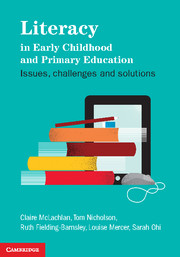Book contents
- Frontmatter
- Contents
- List of figures
- List of tables
- About the authors
- Acknowledgements
- Chapter 1 Introduction
- Part 1 Literacy acquisition: the child, the family and diversity in the modern world
- Part 2 Learning about literacy in early childhood settings
- Part 3 Literacy learning in the primary school
- Chapter 10 The first year of primary school: building on foundations
- Chapter 11 Establishing a community of readers
- Chapter 12 Uses of assessment in the primary school years
- Chapter 13 Reading and writing in the primary school: focus on narrative writing
- Part 4 Literacy learning in the senior primary school
- References
- Index
- References
Chapter 10 - The first year of primary school: building on foundations
from Part 3 - Literacy learning in the primary school
- Frontmatter
- Contents
- List of figures
- List of tables
- About the authors
- Acknowledgements
- Chapter 1 Introduction
- Part 1 Literacy acquisition: the child, the family and diversity in the modern world
- Part 2 Learning about literacy in early childhood settings
- Part 3 Literacy learning in the primary school
- Chapter 10 The first year of primary school: building on foundations
- Chapter 11 Establishing a community of readers
- Chapter 12 Uses of assessment in the primary school years
- Chapter 13 Reading and writing in the primary school: focus on narrative writing
- Part 4 Literacy learning in the senior primary school
- References
- Index
- References
Summary
Chapter objectives
To examine major issues and problems experienced by young children and their parents during the transition to school.
To identify specific strategies that you, the teacher (preschool or primary), can adopt to prepare and support children and parents as they face the many changes involved in the transition process.
To provide a framework for the construction of the literacy program in the first year of schooling.
This chapter examines how continuity from the early childhood setting to the primary school setting can be supported. It reviews research on the discontinuities that children can experience during transition to school and the research evidence on the most effective ways to avoid major mismatches in pedagogy and expectations. The issues of transition from early childhood education to primary school are explored and recommendations for the construction of the initial reading and writing program provided.
The importance of the transition to primary school
The transition from early childhood education, childcare and home settings to the primary school is a significant period in a child’s life and the experience can be very exciting and, at times, daunting for the child and his or her parents. This period of transition marks an important milestone and a new phase in a child’s life. Beginning school marks an era of growing independence for the child as he or she embarks upon the journey from preschool to primary.
- Type
- Chapter
- Information
- Literacy in Early Childhood and Primary EducationIssues, Challenges, Solutions, pp. 161 - 186Publisher: Cambridge University PressPrint publication year: 2012

